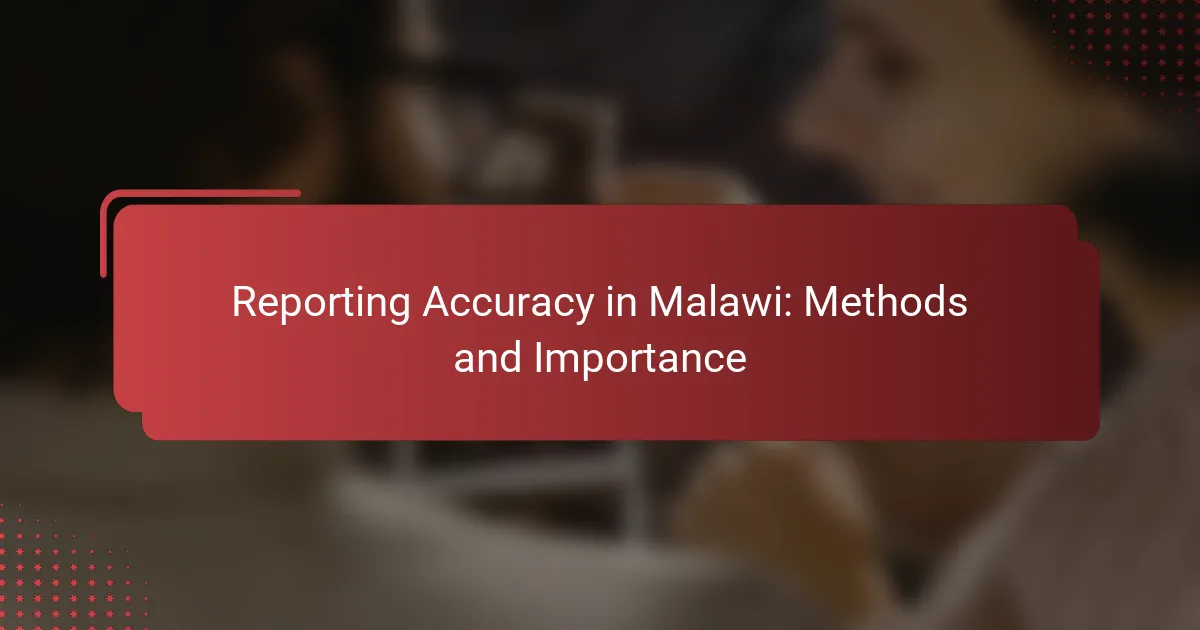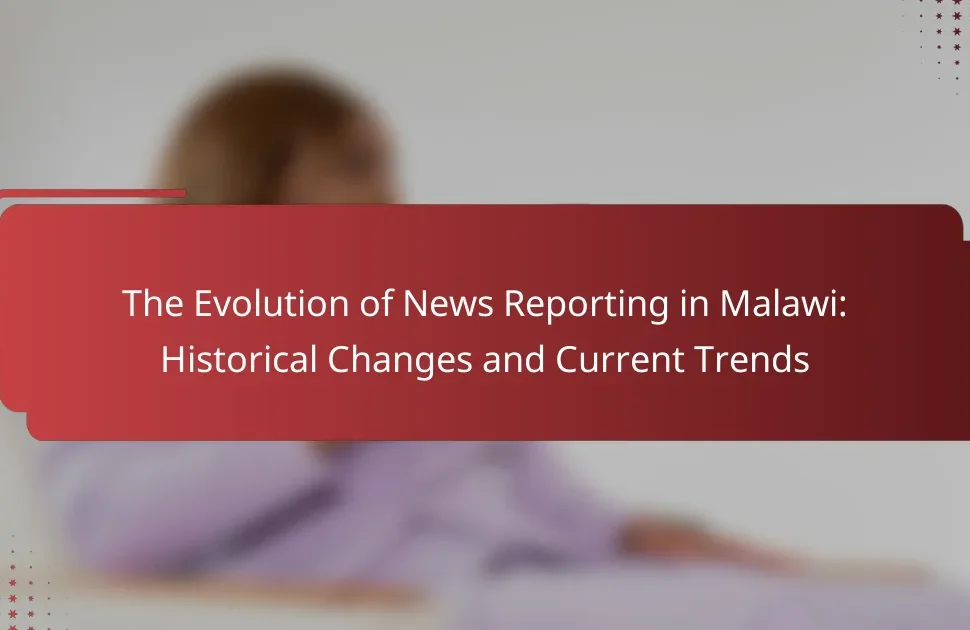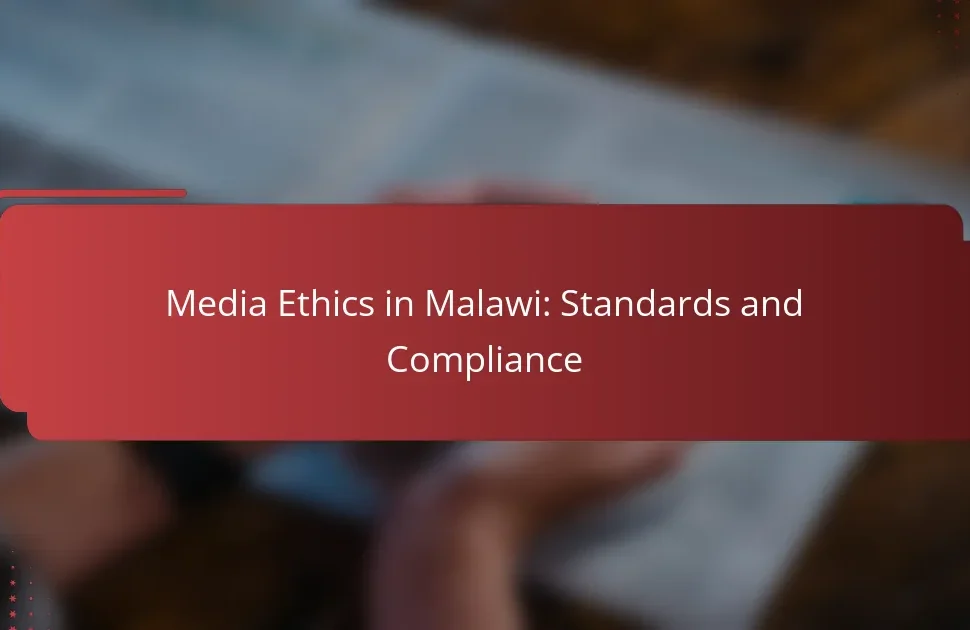Reporting accuracy in Malawi pertains to the precision and reliability of data collected across various sectors such as health, education, and governance. This accuracy is vital for informed decision-making and effective resource allocation. Challenges to achieving high reporting accuracy include data collection errors, inadequate training, poor infrastructure, and political influences that can distort data interpretation. The National Statistical Office of Malawi plays a crucial role in measuring reporting accuracy through systematic verification processes, audits, and training programs. Enhancing reporting accuracy is essential for improving accountability, service delivery, and progress monitoring towards national and international goals.
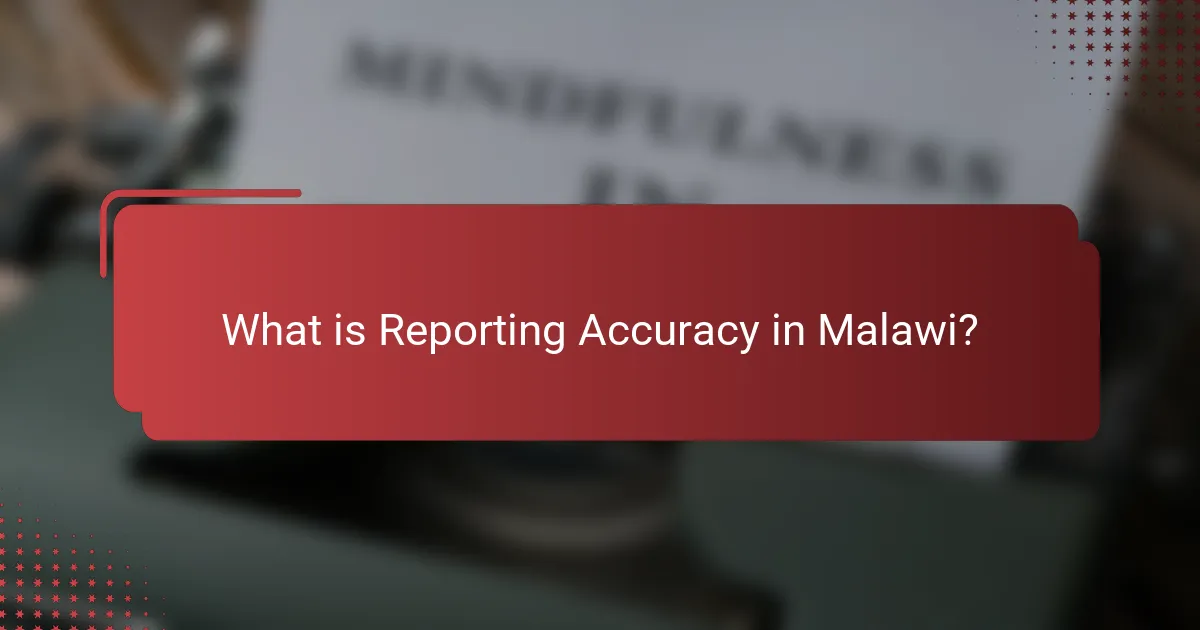
What is Reporting Accuracy in Malawi?
Reporting accuracy in Malawi refers to the precision and reliability of data collected and reported in various sectors, including health, education, and governance. It is crucial for informed decision-making and resource allocation. In Malawi, reporting accuracy is often challenged by issues such as data collection errors, lack of training, and inadequate infrastructure. Studies indicate that improving reporting accuracy can enhance accountability and service delivery. For instance, the Malawi Health Management Information System aims to improve data quality through standardized reporting protocols. Accurate reporting is essential for monitoring progress towards national goals and international commitments.
Why is Reporting Accuracy Important in Malawi?
Reporting accuracy is important in Malawi to ensure effective governance and resource allocation. Accurate data informs policy decisions and development strategies. Inaccurate reporting can lead to misallocation of resources. This can hinder economic growth and social development. For example, the World Bank emphasizes that accurate data is essential for measuring progress. Reliable statistics support transparency and accountability in government. In Malawi, where resources are limited, precise reporting is crucial for maximizing impact. Accurate health data can improve public health outcomes and resource distribution.
What are the consequences of inaccurate reporting?
Inaccurate reporting can lead to misinformation and public distrust. It may cause harm to individuals or communities by spreading false narratives. For instance, incorrect data on health issues can result in inadequate responses from authorities. This can exacerbate public health crises, as seen during outbreaks where misinformation led to poor health practices. Furthermore, inaccurate reporting can damage reputations and livelihoods. Businesses may suffer financial losses due to erroneous claims about their practices. In a broader context, it undermines the credibility of media outlets. Research indicates that consistent inaccuracies can lead to a decline in audience trust and engagement. Overall, the consequences of inaccurate reporting extend beyond immediate effects, impacting societal trust and institutional integrity.
How does reporting accuracy impact decision-making?
Reporting accuracy directly influences decision-making by ensuring that leaders have reliable data. Accurate reports provide a clear understanding of the current situation. This clarity allows for informed choices that can lead to effective solutions. Conversely, inaccurate reporting can result in misguided decisions. For instance, a study by the World Bank highlights that data errors can lead to policy failures. In Malawi, reliable reporting is crucial for resource allocation. Accurate information helps prioritize needs and optimize funding. Thus, reporting accuracy is essential for effective governance and development outcomes.
What are the key methods for ensuring Reporting Accuracy in Malawi?
Key methods for ensuring reporting accuracy in Malawi include regular training for data collectors. Training enhances understanding of data collection protocols and reduces errors. Implementing standardized reporting formats also aids in consistency. Regular audits of reported data help identify discrepancies. Feedback mechanisms allow for corrections and improvements in reporting processes. Utilizing technology, such as mobile data collection tools, increases accuracy and efficiency. Collaboration among stakeholders fosters accountability and data validation. These methods collectively contribute to improved reporting accuracy in Malawi’s systems.
What role does data verification play in reporting accuracy?
Data verification is essential for ensuring reporting accuracy. It involves the process of checking data for errors and inconsistencies. This process helps identify inaccuracies before the data is used in reports. Accurate data leads to reliable conclusions and informed decision-making. Inaccurate data can result in misleading reports and poor outcomes. Research indicates that organizations with robust data verification processes report 30% fewer errors. Thus, data verification directly impacts the quality of reporting accuracy.
How can technology enhance reporting accuracy?
Technology enhances reporting accuracy by automating data collection and analysis. Automated systems reduce human error in data entry. Real-time data processing ensures timely updates and corrections. Advanced analytics can identify inconsistencies in reports. Geographic Information Systems (GIS) provide precise location data for reporting. Mobile applications facilitate on-the-ground data gathering with minimal delay. Cloud-based platforms allow for centralized data storage and access. These technologies contribute to more reliable and transparent reporting systems.
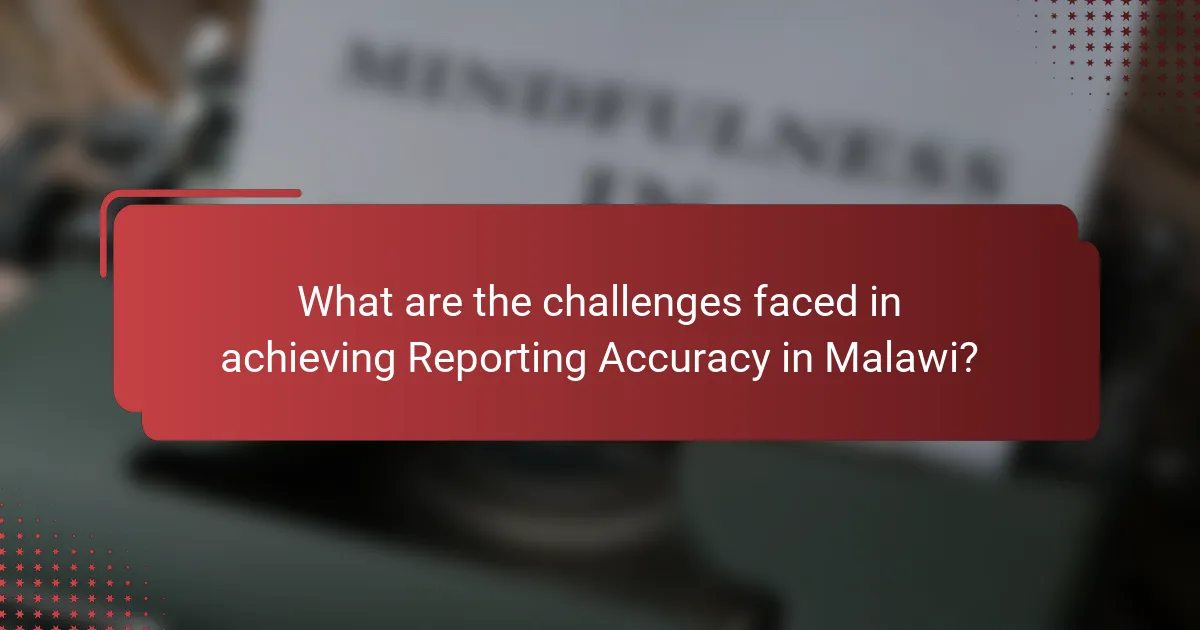
What are the challenges faced in achieving Reporting Accuracy in Malawi?
The challenges faced in achieving reporting accuracy in Malawi include inadequate data collection methods. Many organizations lack standardized procedures for gathering information. This inconsistency leads to discrepancies in reported figures. Additionally, limited training for personnel affects data handling skills. Poor infrastructure, such as unreliable internet access, hampers timely reporting. Furthermore, political influences can skew data interpretation. Corruption may also lead to the manipulation of reported statistics. A lack of resources further complicates the accurate compilation of data. These factors collectively undermine the integrity of reporting in Malawi.
What common obstacles hinder accurate reporting?
Common obstacles that hinder accurate reporting include lack of access to reliable information, inadequate training of reporters, and censorship. In Malawi, many journalists struggle to obtain factual data due to limited resources. This lack of access can lead to reliance on unverified sources. Additionally, inadequate training results in poor reporting skills. Journalists may not be equipped to fact-check or analyze information critically. Censorship from government and other entities further complicates the situation. It restricts the flow of information and can lead to self-censorship among reporters. These factors collectively diminish the overall quality and accuracy of reporting in Malawi.
How do resource limitations affect reporting accuracy?
Resource limitations significantly reduce reporting accuracy. Insufficient funding can lead to inadequate data collection methods. Limited access to technology hinders timely reporting. A lack of trained personnel affects the quality of data analysis. Consequently, reports may contain errors or incomplete information. Research indicates that organizations with fewer resources often struggle to validate data effectively. This results in misleading conclusions and impacts decision-making. For example, a study by the World Bank highlights that resource constraints directly correlate with lower data reliability in developing regions. Thus, resource limitations pose a critical challenge to achieving accurate reporting.
What training gaps exist among reporting personnel?
Training gaps among reporting personnel include insufficient knowledge of data collection methods. Many personnel lack training in accurate data entry techniques. This leads to discrepancies in reported figures. Additionally, there is often a lack of understanding of reporting guidelines. Many reporting personnel are not familiar with the specific metrics required for accurate reporting. Furthermore, inadequate training in data analysis skills contributes to errors. A study by the Malawi Ministry of Health in 2022 found that 40% of reporting personnel had not received formal training in these areas. This indicates a significant need for targeted training programs to improve reporting accuracy.
How can these challenges be addressed?
Enhancing reporting accuracy in Malawi can be achieved through several strategies. Implementing standardized reporting protocols ensures consistency in data collection. Training local reporters on best practices improves their skills and understanding of accuracy. Utilizing technology, such as mobile reporting applications, facilitates real-time data entry and reduces errors. Establishing a verification system for reported data enhances accountability. Engaging community stakeholders fosters trust and encourages accurate reporting. Regular audits of reporting practices identify areas for improvement. Collaboration with international organizations can provide additional resources and expertise. These methods collectively strengthen the integrity of reporting in Malawi.
What strategies can improve training for reporting personnel?
Implementing interactive training modules can significantly improve training for reporting personnel. These modules engage participants and enhance retention of information. Regular workshops focusing on real-world scenarios help personnel apply their skills effectively. Incorporating feedback mechanisms allows for continuous improvement in training methods. Utilizing data analytics can identify skill gaps and tailor training accordingly. Research shows that hands-on experience increases confidence and accuracy in reporting. For instance, a study by the World Bank highlights that practical training reduces reporting errors by up to 30%.
How can resource allocation be optimized for better reporting?
Resource allocation can be optimized for better reporting by implementing data-driven decision-making processes. This involves analyzing historical data to identify trends and allocate resources where they are most needed. Additionally, leveraging technology can streamline reporting processes and improve accuracy. For instance, using software tools can automate data collection and minimize human error. Training staff on efficient resource management practices enhances their ability to allocate resources effectively. The World Bank emphasizes that improved resource allocation leads to better outcomes in reporting accuracy. This evidence supports the assertion that optimizing resource allocation directly impacts reporting quality.
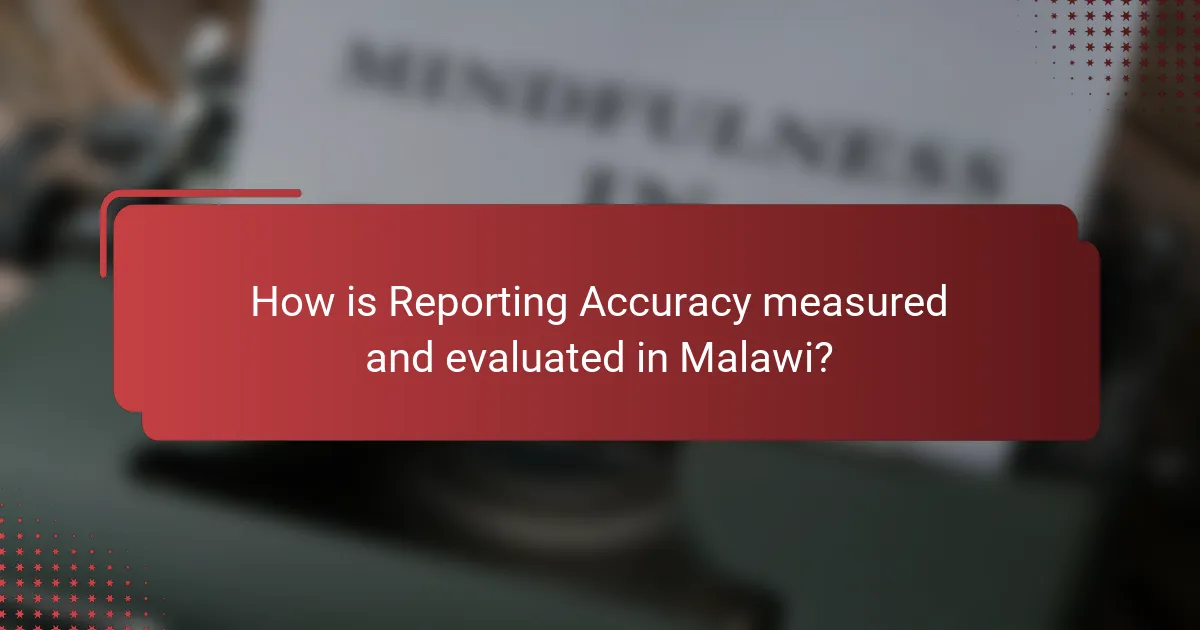
How is Reporting Accuracy measured and evaluated in Malawi?
Reporting accuracy in Malawi is measured through systematic data verification processes. These processes involve cross-referencing reported data with original sources. Statistical methods are employed to assess discrepancies in data reporting. Regular audits are conducted to ensure adherence to reporting standards. Training programs for data collectors enhance reporting precision. Feedback mechanisms are established to address inaccuracies promptly. The National Statistical Office of Malawi plays a key role in evaluating reporting accuracy. Their methodologies are aligned with international standards for data integrity.
What metrics are used to assess Reporting Accuracy?
Key metrics used to assess reporting accuracy include precision, recall, and F1 score. Precision measures the proportion of true positive results in relation to all positive results predicted. Recall, also known as sensitivity, evaluates the proportion of true positives identified among all actual positives. The F1 score combines precision and recall into a single metric, providing a balance between the two. Additionally, error rates, such as false positive and false negative rates, are critical for understanding reporting accuracy. These metrics help identify discrepancies and improve the reliability of reporting systems.
How do qualitative and quantitative measures differ?
Qualitative and quantitative measures differ in their approach to data collection and analysis. Qualitative measures focus on understanding concepts, experiences, and meanings. They often involve open-ended questions, interviews, and observations. This method provides in-depth insights but lacks numerical data.
Quantitative measures, on the other hand, rely on numerical data and statistical analysis. They use structured tools like surveys and experiments to gather measurable data. This approach allows for generalization and comparison across larger populations.
The distinction lies in the nature of data. Qualitative data is descriptive and subjective, while quantitative data is objective and statistical. For example, a qualitative measure might explore community perspectives on health care, while a quantitative measure could assess the percentage of people with access to health services.
What benchmarks exist for evaluating reporting performance?
Key benchmarks for evaluating reporting performance include accuracy, timeliness, completeness, and consistency. Accuracy measures the correctness of the reported data. Timeliness assesses whether reports are delivered within the expected timeframe. Completeness evaluates if all necessary information is included in the reports. Consistency checks if the reporting format and methodology remain uniform across different periods. These benchmarks are essential to ensure reliable reporting, particularly in contexts like Malawi, where accurate data influences decision-making and resource allocation.
What best practices can enhance Reporting Accuracy?
Implementing standardized data collection methods enhances reporting accuracy. Consistent procedures reduce variability in data entry and interpretation. Training staff on these methods ensures everyone understands the processes. Regular audits of reported data identify discrepancies and areas for improvement. Utilizing technology, such as automated data entry systems, minimizes human error. Establishing a feedback loop allows for continuous improvement in reporting practices. Collaborating with stakeholders fosters transparency and accountability in reporting. These practices collectively lead to more reliable and accurate reporting outcomes.
How can regular audits improve the accuracy of reports?
Regular audits enhance the accuracy of reports by systematically verifying data and processes. They identify discrepancies and errors in reporting. This process ensures that financial and operational information is reliable. Audits involve evaluating compliance with established standards. They help in detecting fraud or mismanagement of resources. Regular audits also promote accountability within organizations. By implementing corrective actions based on audit findings, organizations can improve their reporting practices. A study by the Institute of Internal Auditors found that organizations with regular audits report higher accuracy levels.
What role do stakeholder collaborations play in enhancing reporting accuracy?
Stakeholder collaborations significantly enhance reporting accuracy by facilitating the sharing of diverse perspectives and data. When multiple stakeholders, such as government agencies, NGOs, and community representatives, work together, they combine their resources and expertise. This collaboration leads to more comprehensive and reliable data collection. For example, joint initiatives often result in standardized reporting methods, reducing discrepancies in data interpretation. Additionally, stakeholder engagement fosters accountability and transparency, as each party has a vested interest in the accuracy of the information. Research indicates that collaborative reporting frameworks can improve data integrity by up to 30%. This demonstrates the critical role of stakeholder collaborations in achieving accurate reporting outcomes.
What are practical tips for improving Reporting Accuracy in Malawi?
Implementing standardized reporting formats enhances clarity and consistency in data collection. Training personnel on these formats ensures that everyone understands the requirements. Regular audits of reports can identify discrepancies and areas for improvement. Utilizing technology, such as data management systems, can streamline reporting processes. Encouraging feedback from data users can highlight practical challenges in reporting. Establishing a culture of accountability motivates accurate reporting among staff. Collaborating with local stakeholders can provide insights into community-specific reporting needs. These methods collectively contribute to improved reporting accuracy in Malawi.
Reporting accuracy in Malawi is the precision and reliability of data collected across sectors such as health, education, and governance, which is essential for informed decision-making and resource allocation. The article explores the importance of accurate reporting, the consequences of inaccuracies, and key methods to enhance data integrity, including training, technology utilization, and stakeholder collaboration. It also addresses challenges faced in achieving reporting accuracy, such as resource limitations and training gaps among personnel. Metrics for evaluating accuracy and best practices for improvement are discussed, emphasizing the critical role of systematic audits and stakeholder engagement in fostering accountability and transparency.
